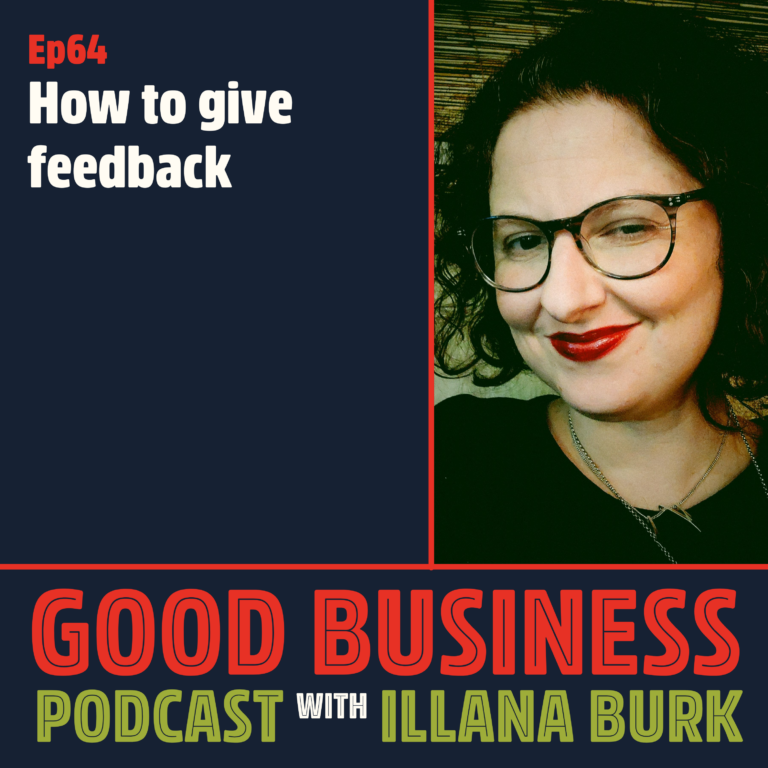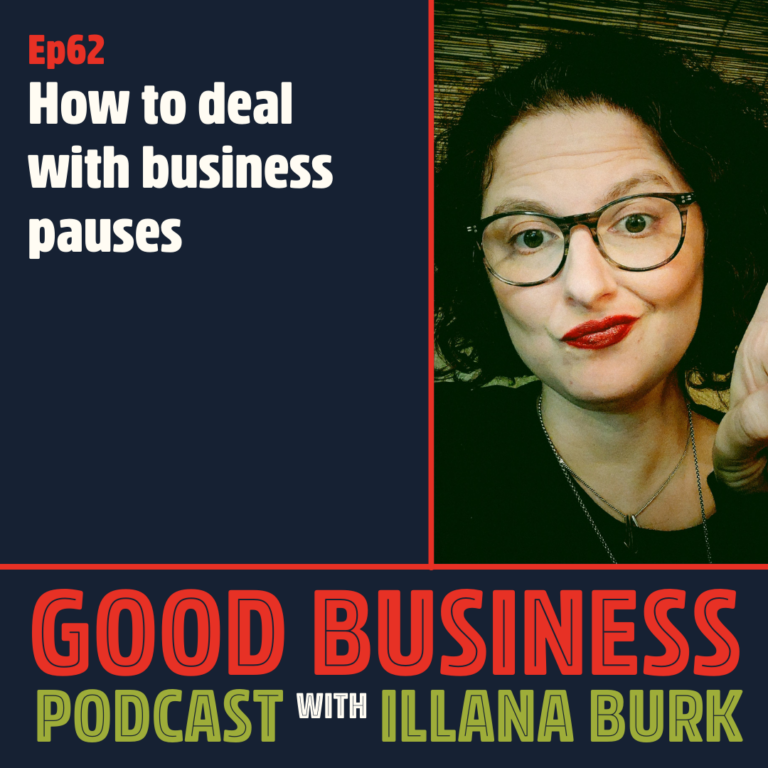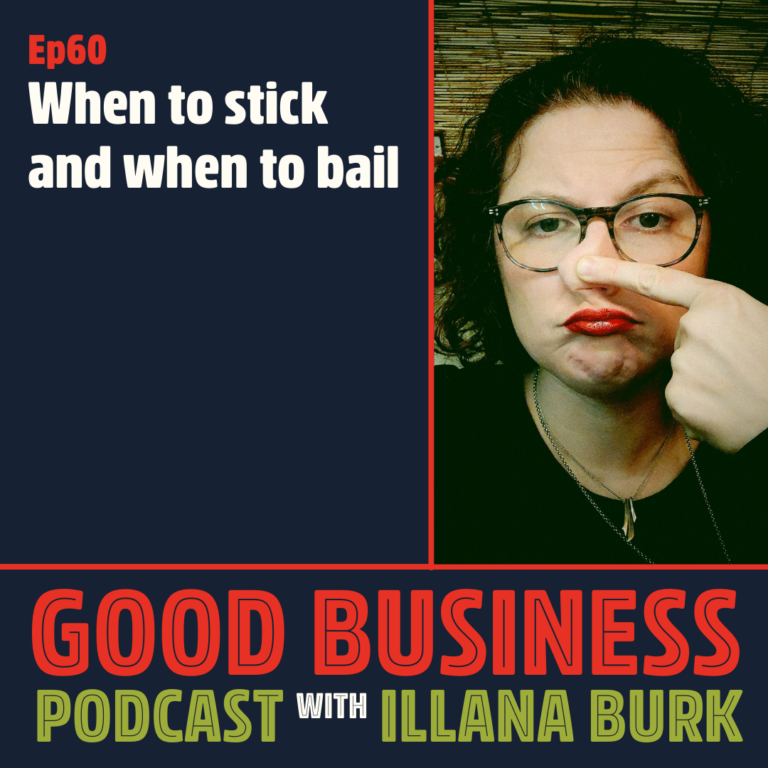Episode Transcript:
I’m Illana Burk, CEO of Your Life’s Workshop, coach to entrepreneurs and solopreneurs across dozens of industries and host of Good Business. With nearly 20 years experience helping hundreds of clients create profitable, ethically driven and sustainable businesses based on their life’s work, I’m here to teach you how to do great work, make great money, and make a positive impact without feeling like you need a shower afterwards.
Hi everybody. Today’s episode dovetails on our last one where we talked about how your value isn’t determined by your price tag. Today, we’re talking about discounts. First, we’re going to talk about why businesses offer them and what their purpose is, and why they are a good idea. Then, we’re going to talk about why they are probably a terrible idea for you and what to do instead. So, first up, discounts are pretty self-explanatory. We all know what a 25% off sign looks like. You set a price based on a cocktail of the value of your work mixed with what the market will bear. A discount is when you drop the price. Duh. Right?
So, what types of discounts exist? First off, there’s primary. A percent or dollar off, buy-one-get-one-free. Then there’s “buy this, get that,” like, “buy this foundation and get this free tote bag.” Then there’s secondary. Pay upfront, like getting a discount. If you pay for a whole project upfront, you get a 10% discount. Coupons, where you buy something, and then you get a discount for the next time you come in. Insider clubs, the kind of thing where you get ten coffees and get the 11th one for free. We call these secondary because these are discounts that are offered for products you’re already buying. They’re not meant to incentivize you to purchase. They’re meant to incentivize you to purchase more. You’ve already made a buying decision, and now you’re getting a reward, trying to get you to be a more loyal customer. That’s essentially what secondary discounts are made for.
Why do businesses offer discounts, to begin with? First, because business is bad. This is not an all-encompassing list but are the most common reasons. First, because business is bad; second, because they’re trying to generate buzz. Third, because they have failed to market well. Fourth, because there’s some sort of special event happening. Fifth, because the market has or is about to make a turn and their product is about to become irrelevant or has already done so. This is going to be seasonal. This can be some innovation in the market that’s going to make whatever their thing is that they’re selling no longer a necessity. So it gets sold at a bargain basement. We’ve all seen it. That could be anywhere from a Halloween stuff gets discounted on November 1st, to last year’s iPhone gets discounted when this year’s iPhone comes out or this month’s I found apparently.
So, what kind of businesses should offer primary discounts and what circumstances are considered good for discounts? First, product-based businesses that change offerings frequently. So seasonal merchandise, that’s the perfect thing to discount. People only need it certain times of the year, and it’s not going to devalue anything by again, offering that discount on candy on November 1st. Commodities, daily use items, things that people are going to buy no matter what the price is, but that might incentivize them to buy more or to be more brand loyal. Anywhere from soap to coffee – consumables. Then, there’s the high desire, high use items. So, cars, houses, meals. Things people really, really want and are going to use a lot of. Those kinds of things are not going to devalue the actual product by offering a discount on them because people really, really want them and they really, really use them, and they’re expensive to begin with, often.
So, why only these types? Why is this a bad idea for other types of businesses? First off, because their value is not in question, nor is it determined by the price. If you’re in a business where people will love your thing no matter what they pay for it, then discounts are basically irrelevant, and decisions around them can be based on whatever circumstances your business faces at the time. So if you need to generate liquidity, you need to raise some more money, you can totally offer a discount to do that if your product falls into one of those categories. But, if you’re a values-based business owner, then setting a price is only part of the equation. There’s so much more to the mix to convey that value. Marketing, messaging, branding, content, touchpoints, and all the rest of it comes into play. If your offering is fundamentally not the most straight forward than discounts are the last thing you want to add into the mix because it confuses and muddies the water.
First, you need to understand what motivates the buying decisions of your people. What are you helping them do? What are you helping them feel? What are you helping them understand? If your answer goes past a couple of words, then discounts are not for you. If your answer is, “I sell clothes,” okay, sure, you can offer a discount once in a while, it’s not going to harm your business. But if it’s something more like, “I help purpose-driven healers create marketing plans that empathize with their mystical connection to the Netherworld,” well then, discounts are basically just a nice way of making your marketing complicated and yielding the opposite of the results that you want.
I want to address something really quickly here. It’s calling out a contradiction. In my last episode, I talked about how your value is not determined by your price. So, that might feel like a contradiction to what I’m saying here. It isn’t, your value is not determined by your price, but it IS determined by how empathetically you market yourself and the integrity with which you do so.
If you say, I charge x for my services because that’s what I need to cover my expenses, make a comfortable profit and continue to thrive but in the very next breath you’re saying, “actually I’m totally comfortable taking 30% less,” you are falling out of integrity and basically telling them that your primary priced tag was total bullshit. You’re essentially saying, I lied to you yesterday. Beyond that, you’re undermining trust. Fundamentally, that’s what’s underneath that. By changing your price tag, you essentially convey that the first level was a lie. When the effectiveness of your work and your offer is based entirely on how much the person buying trusts you, it’s of critical importance that you maintain that trust in every touchpoint, no matter what. Offering that discount and losing that trust can cost you a whole lot more than not getting the sale at all.
I promise you, the people who buy your services at a discount – and this is an important detail here – they’re buying ONLY because there was a discount, they will never be the ones that become your raving fans. They’ll never be the years-long customers who come back again and again and rave about you. One more time, let me be crystal clear on why. It’s not because your pricing and your value are intrinsically linked. It’s because the people who bought on sale don’t have the same level of trust for you, your word and your offerings than those who buy it full price and who never see you discount anything. Therefore, you are more effective when people trust you. They listen to you more when they trust you. That’s why you hear people constantly hammering on you should raise your price and therefore get a higher value. It’s not for the reason you think. It’s not because they’ll value it more highly at a higher price tag. It’s because they will trust you more when it’s more expensive and when you establish that as your value level. It’s about trust, not price. It’s about trust, not value. Without trust, value is meaningless.
What do you do instead? You create promotions that build trust, and I want to make that clear. Promotion is not the same thing as a discount. You can promote all kinds of things. Promotions are good. Of course, you want to build buzz. That’s marketing. I’m never going to say marketing is bad. I love marketing. Marketing’s communication. We love marketing. So, here are a few trust-building promotion ideas that absolutely work in promoting your offers AND deepen the level of buy-in that new clients have right from the jump.
This is not a complete list, but you may want to get a pen for this part. I’ll wait. Get a pen. Seriously, you’re going to write this shit down. This is actual stuff, you guys. I know podcasts don’t often give you real things, but I’m going to actually give you lessons. This is stuff that I teach my clients and stuff I teach in courses. I’m going to give you a rundown. These are the most effective ones I’ve seen that both build trust and establish value.
The first is the value add. This is basically, “my regular price is x, but right now, I’m also offering an additional session with me.” You’re preserving the integrity of your core value offering. By doing this, you’re preserving the integrity of your core value offering while also creating an attention-getting promotion. You see this a lot in education and leadership brands. Another example of this would be “buy this and get this free gift.” That’s another way of doing that. If it’s informational, you want that gift to compliment your product; it can be something that you would use in concert or in addition to. This is similar to one of those things on that primary list, but that’s more, “buy this flashy thing that makes you want the first thing more. So that will make you buy this other thing more.” That’s different. This is more, “buy this course, and I’m going to give you a workbook with it that’s going to deepen your experience with the course.” Does that make more sense? Okay.
Second up in our types of promotions; the scholarship. I do this one ALL the time. I even have a scholarship fund set up so that my more successful clients can contribute. How does a scholarship differ from a discount? Well, two ways. One, if you do it right, you actually fund the scholarship. Meaning, you have some way of getting actual real money into the scholarship fund. You give someone $100 off, and you still get paid. This is how I do it. Clients contribute to it, and then I match 100% in my hourly time. This comes out to me, making my base rate. I’d say probably 99% of the time, even with my scholarship clients, I still make the same amount of money that I would with anybody else, but it facilitates that happening because beneficiaries of my scholarship are coming back and contributing to it when they get more successful. If you want to know more about it, you can email me, or you know, ask.
The second way, your scholarship is a discount in disguise. There are two ways. The first is you fund it. The second is a discount in disguise. This is okay in my book as long as you work to build any potentially lost trust by showing how deeply care you care about the scholarship, and it’s recipients. You do this by really engaging with the process. You don’t make it easy for them to get it. You show potential recipients that it matters a lot to you and that it’s not just a freebie. It’s different than saying, “my services are 20% off to everybody who comes in the door in the next 30 days.” That’s a completely different thing than saying, “I’m offering a one-seat scholarship for one person and here are the nine hoops you need to jump through to make sure that you’re the right person for it.”
Now, a sidebar about scholarships. This is an opinion, but don’t make your scholarships public. In other words, don’t make people jump through hoops for money publicly. I fucking hate this shit. I see people do this on Instagram all the time where it’s like, “you can get a free hour of coaching if you tell me below in the comments, all the reasons why you need more confidence.” That’s terrible. I’m sorry. You’re putting somebody in an extremely vulnerable position who already needs help, and then you’re making them feel more vulnerable and more public shame. Way to go on that. Make it private. If you want to bring in a pool of people, you want to bring it together, make a community out of the people who are all applying. Start a little Facebook group that’s temporary for people that are applying for your scholarship and then they can share and make it a way that they can connect with one another. You never want to create shame in somebody who needs a handout. It’s okay, it’s a handout, we can call it that, but you don’t want to make them feel bad about it. That’s not going to help their business. That’s not going to help their growth. That’s not going to help them feel good about working with you. That’s DEFINITELY not going to help them trust you. That’s for fuck’s **** excuse me, excuse my French. I know, I swear too much.
Third up – the package deal. Bundle things together occasionally and offer a nominal drop in the price while maintaining a high bracket. Keep the price high but bundle them together so that it keeps the same sort of positioning as far as the financial bracket that you’re marketing to, but it gives more value. If somebody needs to dig deep in their pockets or fund with a little bit of debt financing, then you’re giving them a much higher value, so that feels okay. This builds trust mostly in those who are already deeply committed to working with you and buying from you. Trust isn’t really an issue for them. You’re essentially rewarding them for their attention and loyalty. This is a great thing to offer to a loyal email list. It’s kind of a back pocket sell.
The Beta test – this one is contentious because it only works when it’s real. I see plenty of people pretend to Beta test when they are actually just calling it that and they’re just trying to get people to notice them, and think that they can offer a steep discount without penalty. What they’re doing and saying is, “hi, I’m new, and I have very little confidence in what I’m doing. Please, please, please, please, please, please, please buy my thing. I need people so bad. Seriously, please, please, please. I’ll basically give it away.” That is not a Beta test, okay? A real Beta test comes from someone who already knows what they’re doing, and legitimately wants to test a new offer. They do this in a clear and formal way. They ask for significant and specific feedback to use, and they use it as part of their process to grow and evolve. Believe me; people can smell the difference. There are so many business coaches that tell people to offer a Beta test to get their first clients. It’s the stupidest idea ever. It’s so transparent. You’re going to get a bunch of wrong people that are wrong for your offer and are just looking for a fucking bargain that does nothing, nothing for your business growth, and it will stomp on your confidence when you’re new. Please do not offer a Beta test. There are other ways to get people in the door, and we’ll talk about those on innumerable other episodes, but not today.
Finally, the payment plan. I am a huge fan of payment plans. I do them all the time. Nothing says, let’s trust each other, more than, “my thing costs two K, and I’m okay with you paying it off long after our work is done.” It says you’re confident in your work and you care about affordability and accessibility. This is a sidebar, but I never upcharge for payment plans. Yes, it might make like 5% less because of the repeated admin and fees and everything, but a client who would never have been able to benefit from working with me – the gift of that trust is everything. Why on earth would I want to penalize somebody over a few bucks? 99% of the time, these are the clients who work the hardest and build their businesses and work and work and work, and they almost always come back with me and support the scholarship fund later.
I’d say 75% of the people who benefit from long payment plans have come back and contributed to the scholarship fund, which means they’re funding the work of other people that come up behind them. What could be better than that, people? I have clients that have paid me off and taken so long to pay off giant branding projects that by the time they’re paid off, they’re ready for a rebrand and we just start over again. In 11 years, I have never, never, not once, not ever had anyone stiff me on their balance on their payment plans. Why? Because I do good work and they trust me, and I trust them. It’s as simple as that.
There you have it. We talked through why discounts are probably a bad idea for most of my listeners, who they’re actually good for, and you now have a bunch of ideas of what to do instead. Go forth and trust. See you all next time. Bye Bye.
Thanks so much for hanging out with me today. For more information, visit www.thegood business.co or www.yourlifesworkshop.com.
More Episodes
How to give feedback | GB64
In this episode, we’re tackling the often-dreaded task of giving feedback. We all know how important feedback is for growth, but delivering it in a constructive and respectful way can be a challenge.
Join us as we explore the art of giving feedback without being a jerk. We’ll discuss why feelings matter in business, the four key steps to giving effective feedback, and how to approach difficult feedback with empathy and honesty.
How to ask for and take feedback | GB63
Navigating feedback can be daunting. In this episode, we dive into the skills of asking for and receiving feedback with intention and grace. Learn the art of crafting your asks to elicit constructive insights and how to...
How to deal with business pauses | GB62
In the fast-paced world of entrepreneurship, taking a break can often feel like a foreign concept. The constant pressure to grow, scale, and make a bigger impact can make prioritizing personal well-being and life outside of work...
The problem with most excellent plans | GB61
Ever plan an amazing business move but hit a roadblock? This episode tackles the "pothole" of poor planning for solopreneurs. Learn how to "right-size" your strategy based on your resources and set yourself up for sustainable...
When to stick and when to bail | GB60
Feeling stuck in a business project that’s not taking off? This episode’s for you! We explore the often-overlooked skill of quitting and guide you through 4 key questions to help you decide when to persevere or let go. Learn to identify your true motivations, navigate self-doubt, and make choices that align with your goals and well-being. Listen to discover when to stick and when to bail!
You might not need a VA after all | GB59
Overwhelmed business owner? Stop! Hiring a VA might not be the answer. Learn how to ID expert vs. VA tasks & hire the right person for the job (without becoming a “shitty boss”). Listen in and get bonus tips in the show notes!




